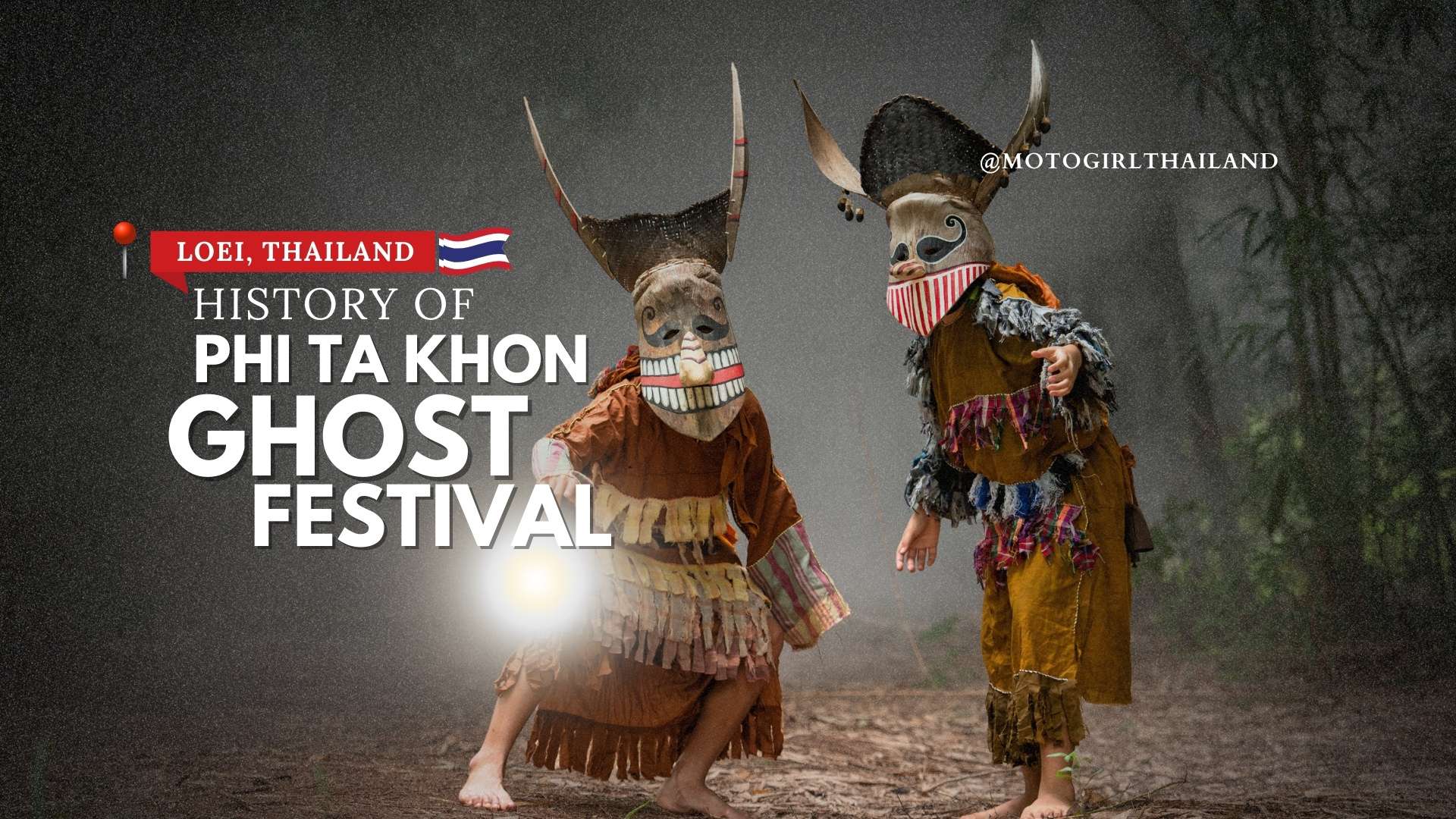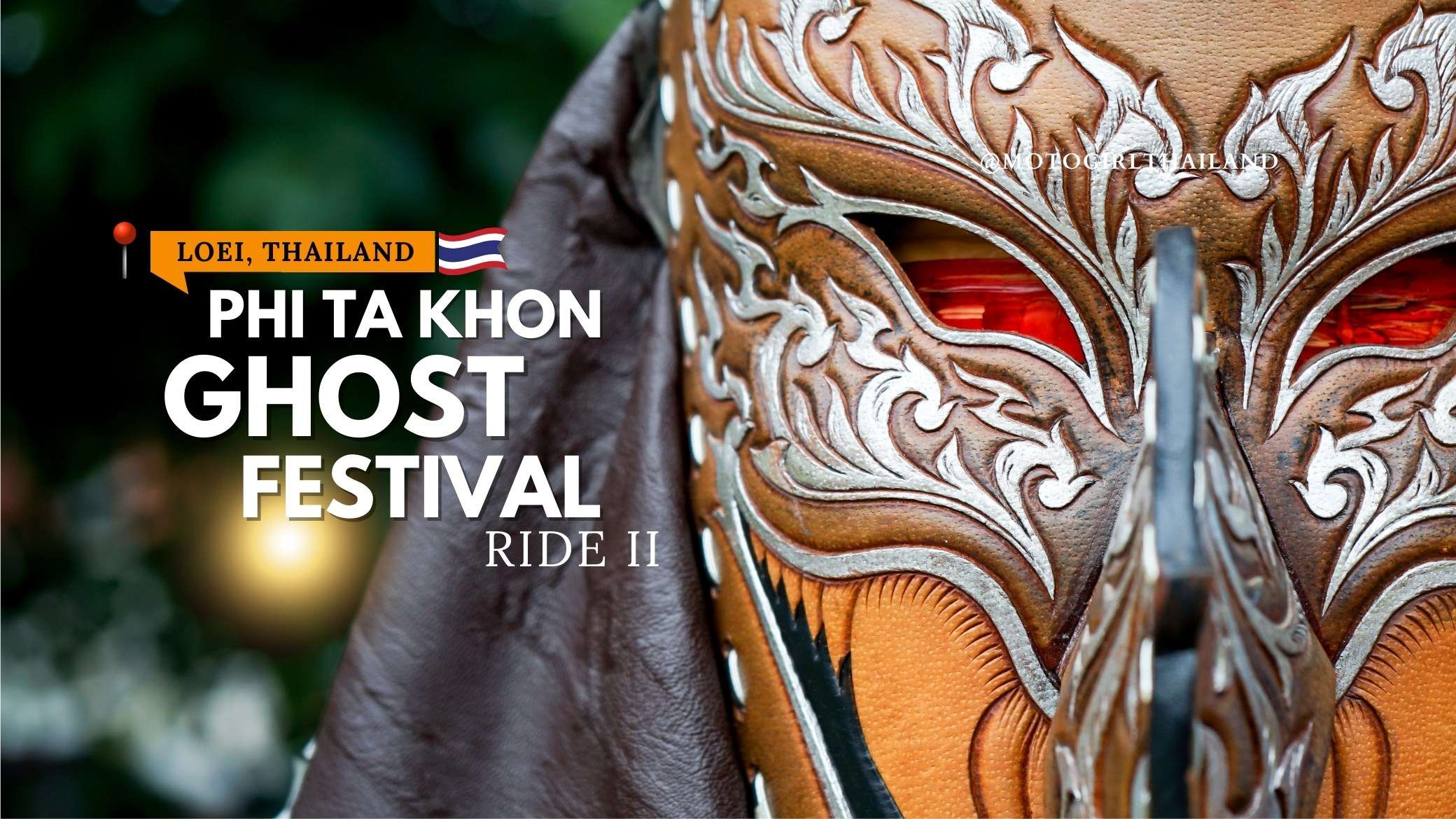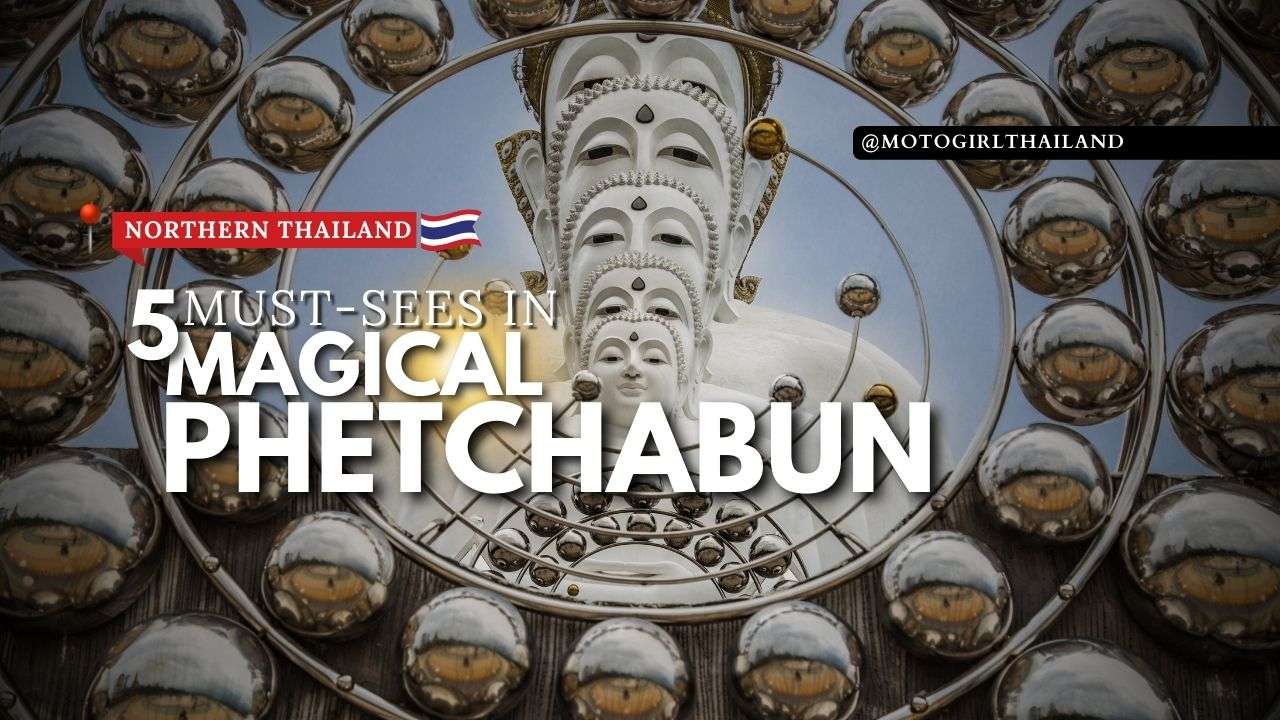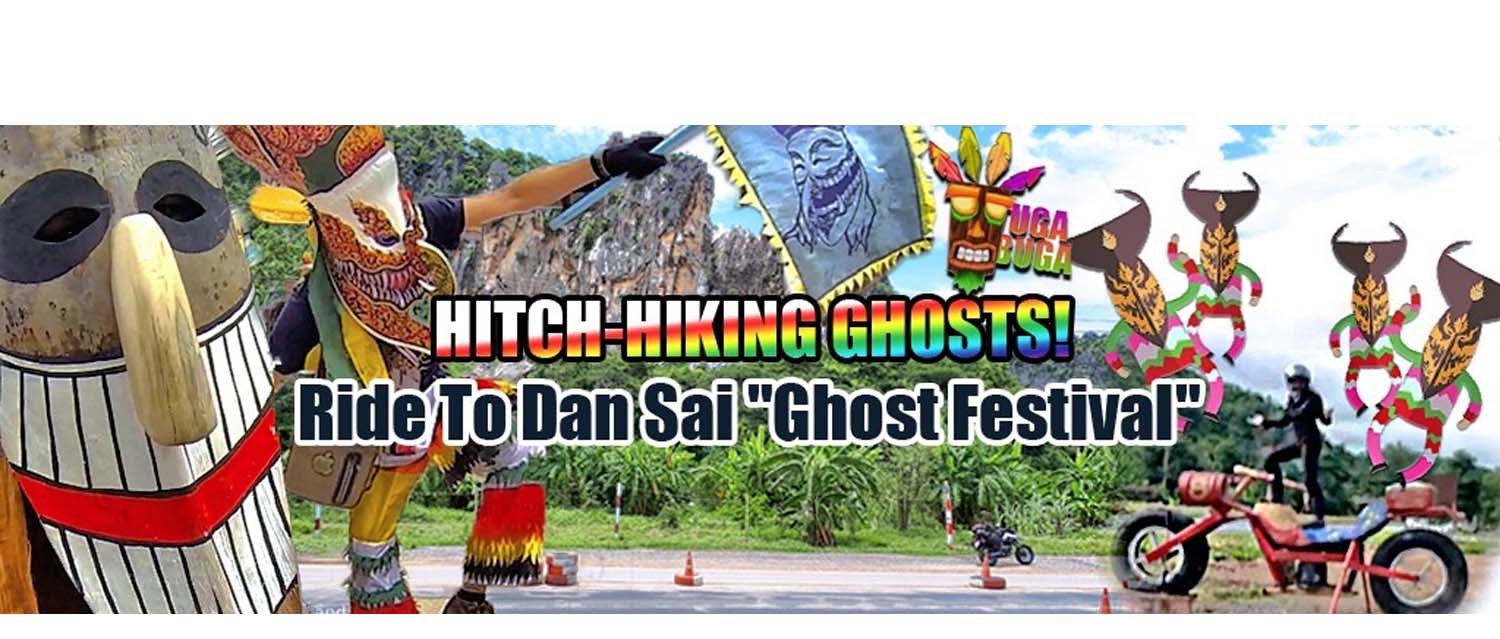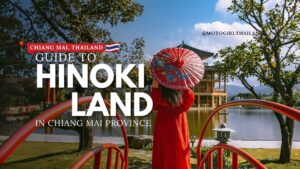ผีตาโขน. Thailand is renowned for its vibrant and colourful festivals, each with unique cultural and historical significance. Among these, the Phi Ta Khon Ghost Festival stands out for its captivating blend of mythology, tradition, and community spirit. This article delves into the fascinating history and traditions of the Phi Ta Khon festival, offering a comprehensive look at the history of Phi Ta Khon, one of Thailand’s most enchanting cultural events.
(Click HERE if you would prefer to watch a video on the history of Phi Ta Khon, instead)
Table of Contents
The Origins of Phi Ta Khon
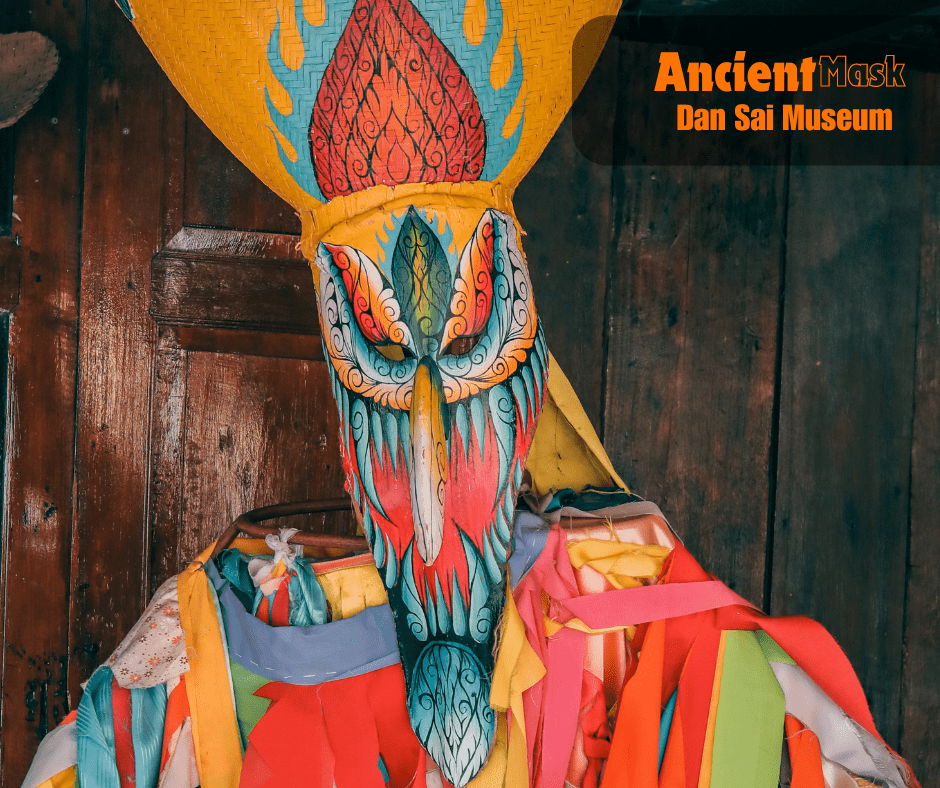
Historical Background
Phi Ta Khon, often referred to as the “Ghost Festival,” is a centuries-old tradition deeply rooted in the folklore and religious practices of Thailand.
Originating in the small town of Dan Sai in Loei Province, this festival is believed to have evolved from a combination of Buddhist and Animist beliefs (the belief that objects, places, and creatures all possess a distinct spiritual essence). The exact origins are shrouded in mystery, but it is generally thought to have begun as a way for the villagers to honour and communicate with spirits, seeking their protection and blessings.
Cultural Significance
The cultural significance of Phi Ta Khon lies in its unique blend of religious devotion and community celebration. It is an expression of gratitude to the spirits for their blessings and a plea for continued protection. The festival also serves as a reminder of the interconnectedness of the spiritual and physical worlds, a concept deeply ingrained in Thai culture.
The Mythology Behind Phi Ta Khon
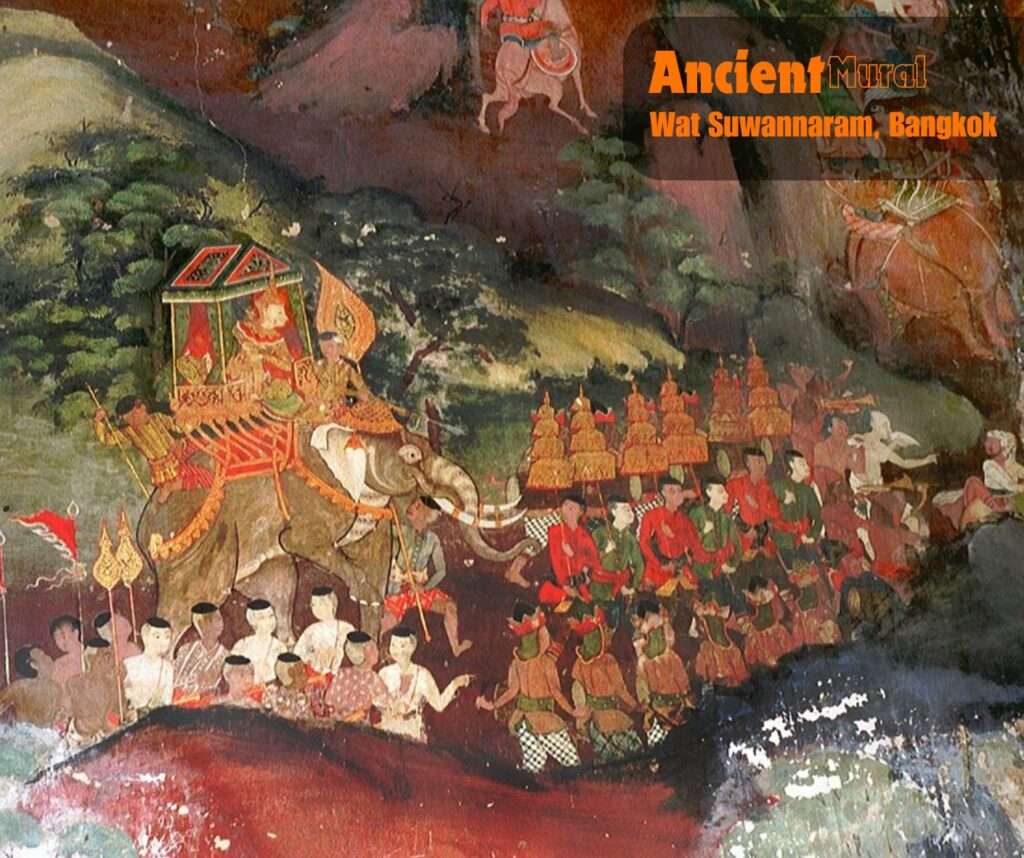
The Legend of Vessantara Jataka
At the heart of the history of Phi Ta Khon ghost festival is the legend of Vessantara Jataka, a story from Buddhist scripture about the penultimate incarnation of the Buddha. According to the legend, Prince Vessantara, known for his extreme generosity, was banished to the forest. When he returned, the joyous celebration was so loud and lively that it was believed to have awakened the spirits of the forest, who joined in the festivities. This story is reenacted during the festival, symbolizing the harmony between humans and spirits.
Spirits and Ghosts in Thai Culture
In Thai culture, spirits and ghosts (known as “phi”) play a significant role. They are believed to inhabit natural elements and can influence the lives of the living. The history of Phi Ta Khon reflects this belief, as the festival is a time to honour these spirits, asking for their favour and ensuring they are not angered.
The Unique Traditions of Phi Ta Khon
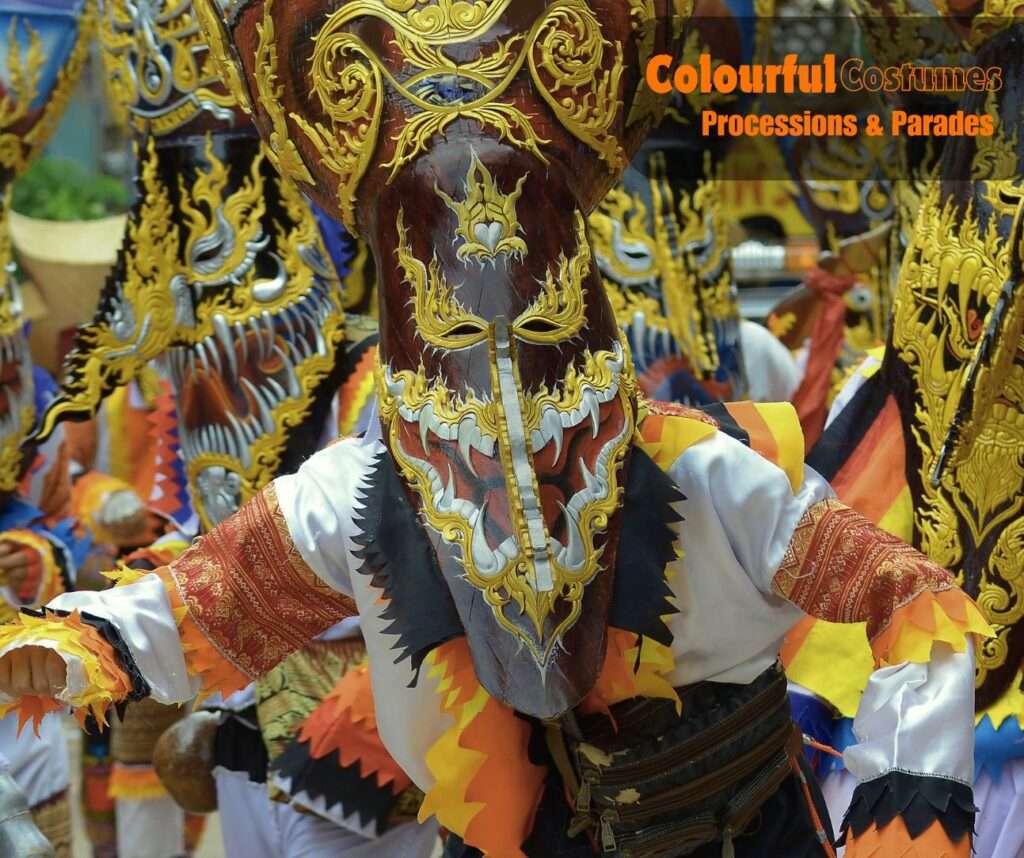
The Colorful Costumes
One of the most striking features of Phi Ta Khon is the elaborate and colourful costumes worn by participants. These costumes are an intrinsic part of the history of Phi Ta Khon and are designed to resemble ghosts and spirits, designed with intricate details that make each one unique.
Mask Making
The masks are a central element of the costumes, typically made from carved coconut tree trunks, rice husks, and bamboo. These masks are painted with vivid colours and feature exaggerated facial features, including large eyes and grinning mouths. The process of making these masks is a cherished tradition with strong ties to the history of Phi Ta Khon, passed down through generations.
The Processions and Parades
The festival is marked by lively processions and parades, where participants dance and play music while donning their ghostly costumes. These processions wind through the streets of Dan Sai, creating a mesmerizing spectacle of colour and sound.
Music and Dance of Phi Ta Khon
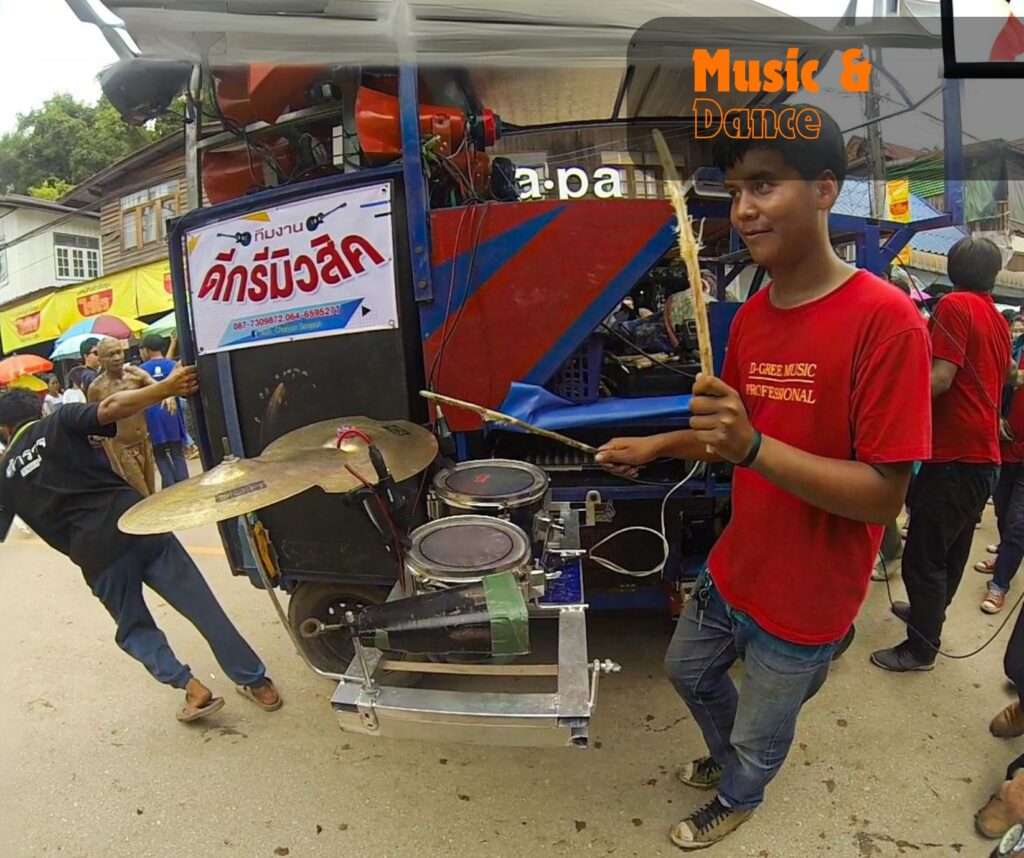
Traditional Instruments
Music is an integral part of the history of Phi Ta Khon. Traditional Thai instruments such as drums, cymbals, and gongs provide the rhythmic backdrop for the celebrations. The music is both lively and haunting, perfectly complementing the ghostly theme of the festival.
Dance Performances
Dance is another key element of the festival, with participants performing traditional Thai dances that tell stories and honour the spirits. The dances are often spontaneous and energetic, reflecting the joy and excitement of the festival.
The Rituals and Ceremonies of Phi Ta Khon
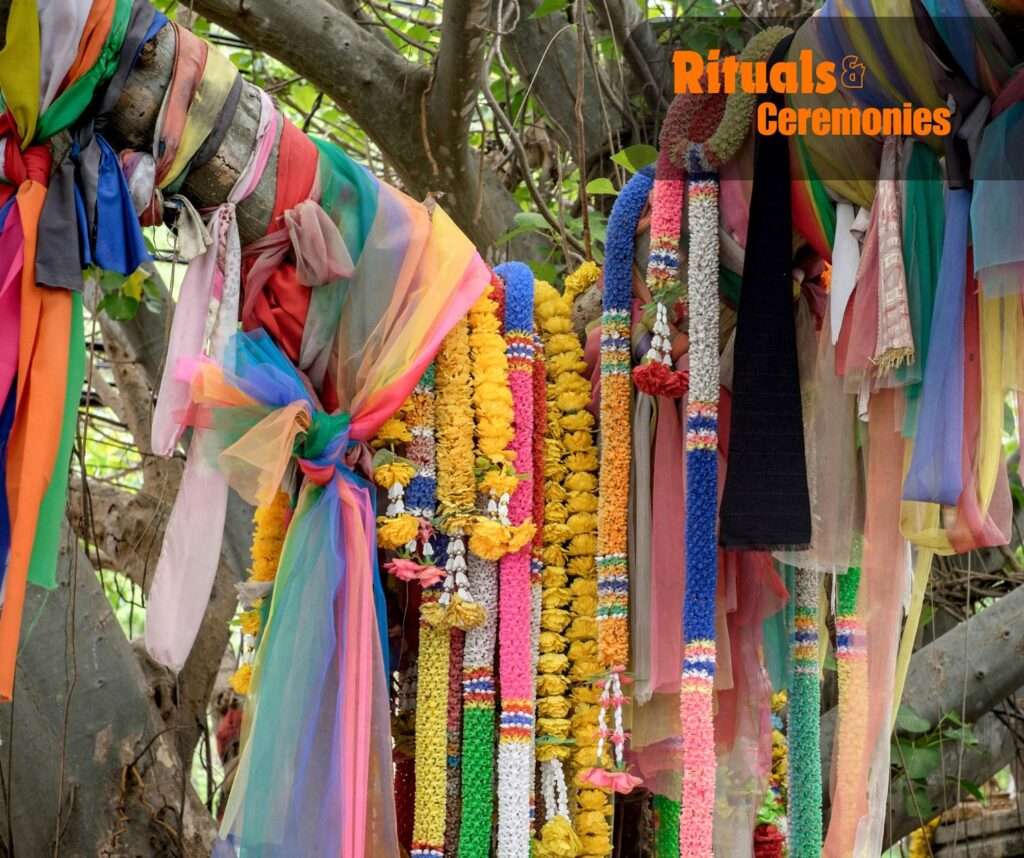
Spirit Mediums and Rituals
Spirit mediums play a crucial role in the festival, acting as intermediaries between the human and spirit worlds. They perform rituals to communicate with the spirits, seeking their guidance and blessings for the community.
The Buddhist Influence
While the history of Phi Ta Khon has its roots in animist beliefs, it is also heavily influenced by Buddhism. The festival includes several Buddhist ceremonies, such as merit-making rituals, where offerings are made to monks and prayers are recited.
Food and Festivities
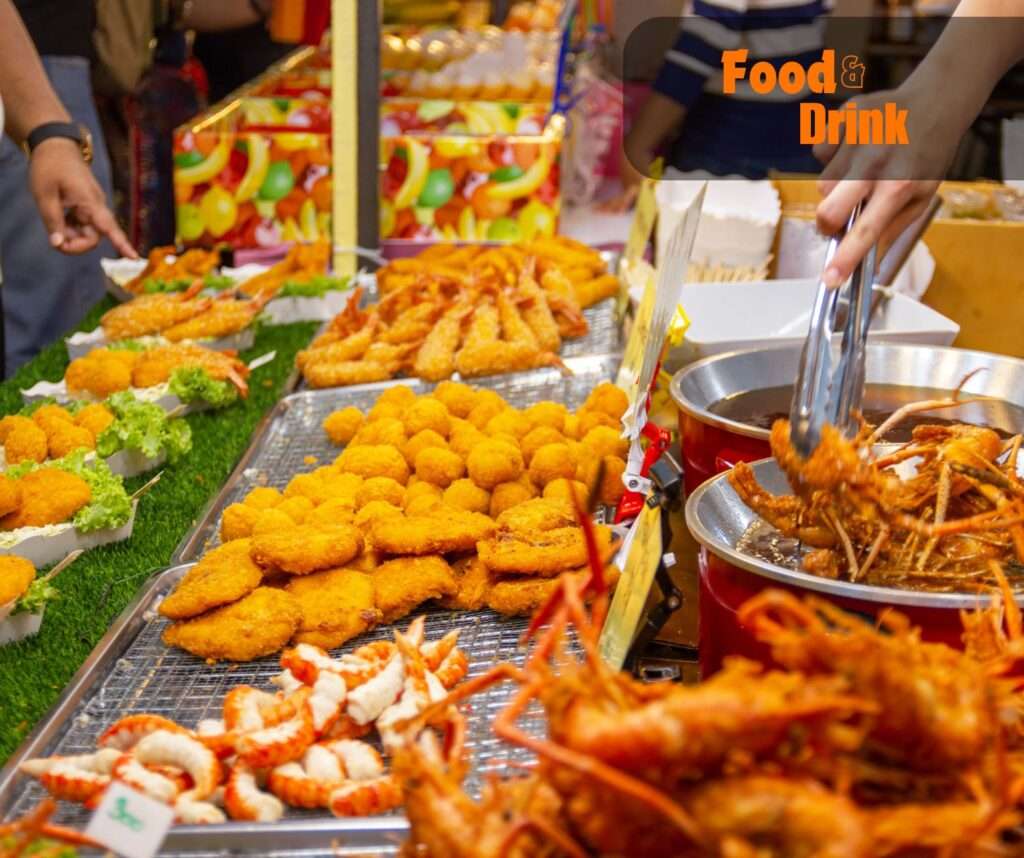
Traditional Thai Cuisine
No festival in Thailand is complete without delicious food, and Phi Ta Khon is no exception. The streets of Dan Sai are lined with food stalls offering a wide array of traditional Thai dishes, from spicy curries to sweet desserts.
Festival Foods
In addition to everyday Thai cuisine, there are special foods prepared specifically for the festival. These include traditional snacks and sweets that are shared among the participants and visitors. Watch out for the local Thai Whisky (Lao Khao). It is strong and will knock your socks off!
Modern Adaptations and Tourism
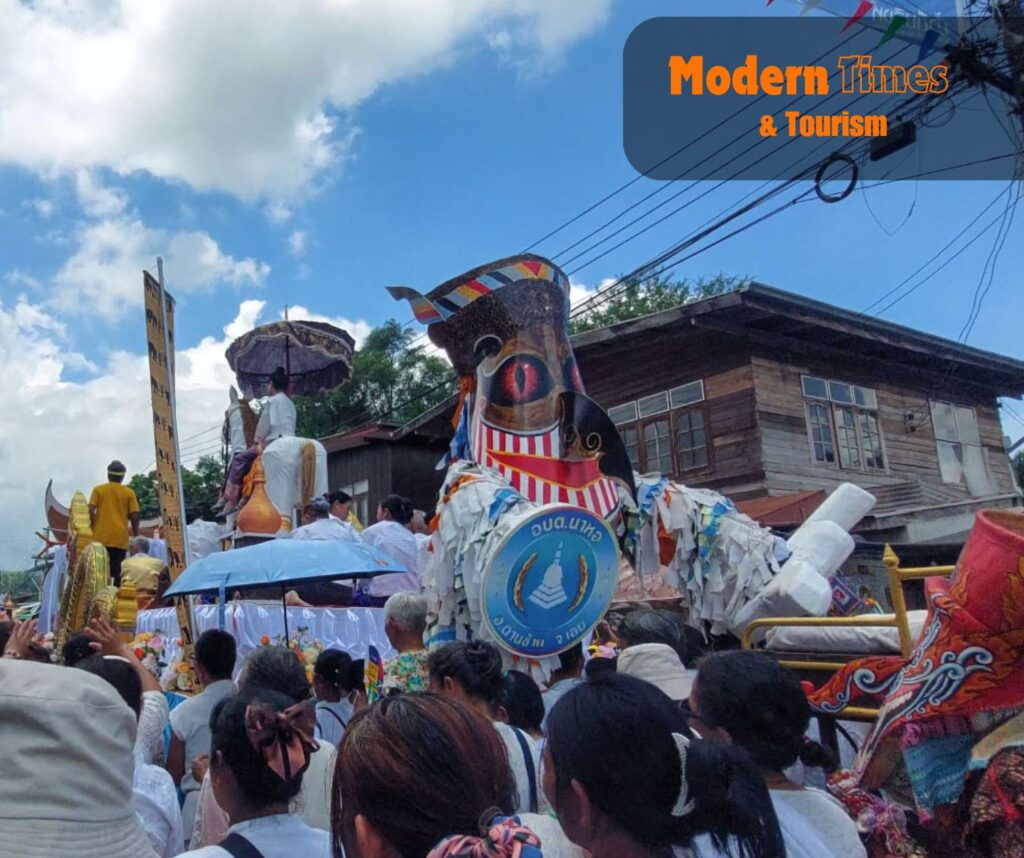
The Evolution of the Festival
Over the years, the Phi Ta Khon Ghost Festival has evolved to incorporate modern elements while still retaining its traditional roots. This evolution reflects the changing times and the community’s efforts to keep the festival relevant and engaging for younger generations, whilst still incorporating the original history of Phi Ta Khon.
Impact of Local Tourism
Phi Ta Khon has become more recognised as a unique and interesting Festival to visit in Thailand, drawing local and international visitors. This influx of tourists has brought economic benefits to Dan Sai, helping to support local businesses and preserve the festival’s traditions. On the flip side, it does mean more congestion in a very small town.
The Importance of Phi Ta Khon to Thai Identity
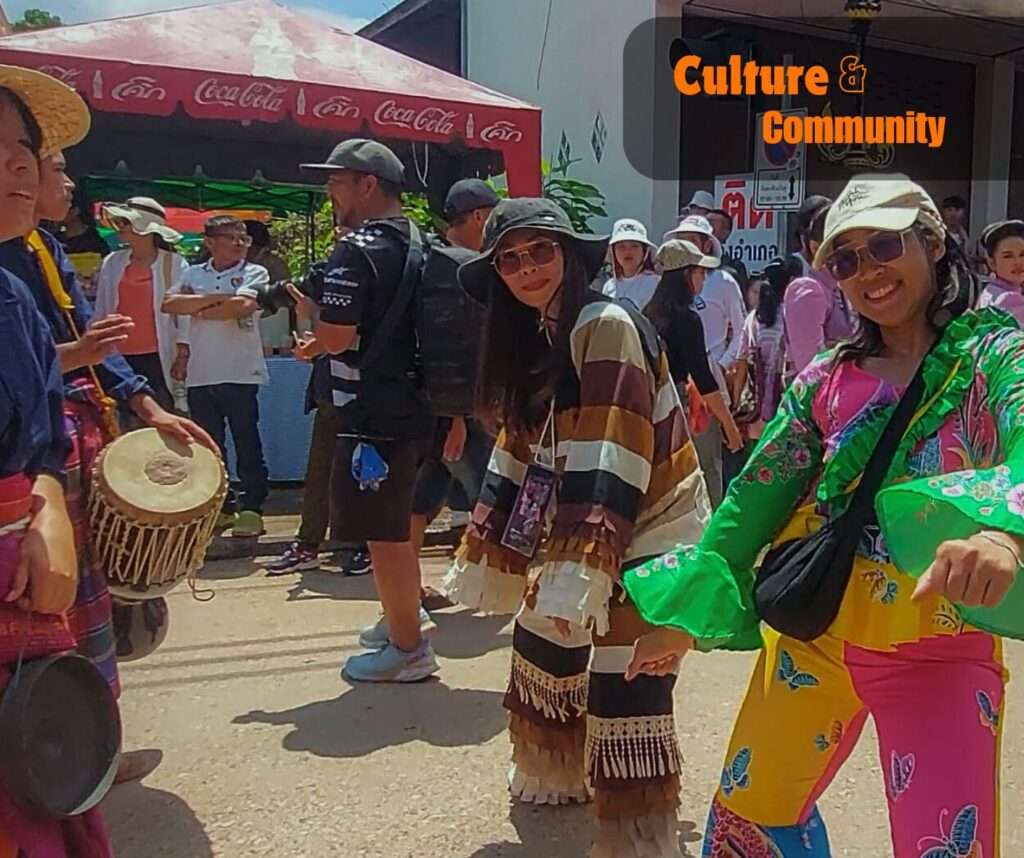
Cultural Preservation of the History of Phi Ta Khon
Phi Ta Khon plays a vital role in preserving Thai culture and traditions. It is a living testament to the country’s rich heritage, showcasing the unique blend of religious and animist beliefs that define Thai identity.
Community Involvement
The festival is a community affair, with everyone in Dan Sai playing a part in the celebrations. This sense of community involvement strengthens social bonds and fosters a shared sense of pride and identity.
The Future of Phi Ta Khon
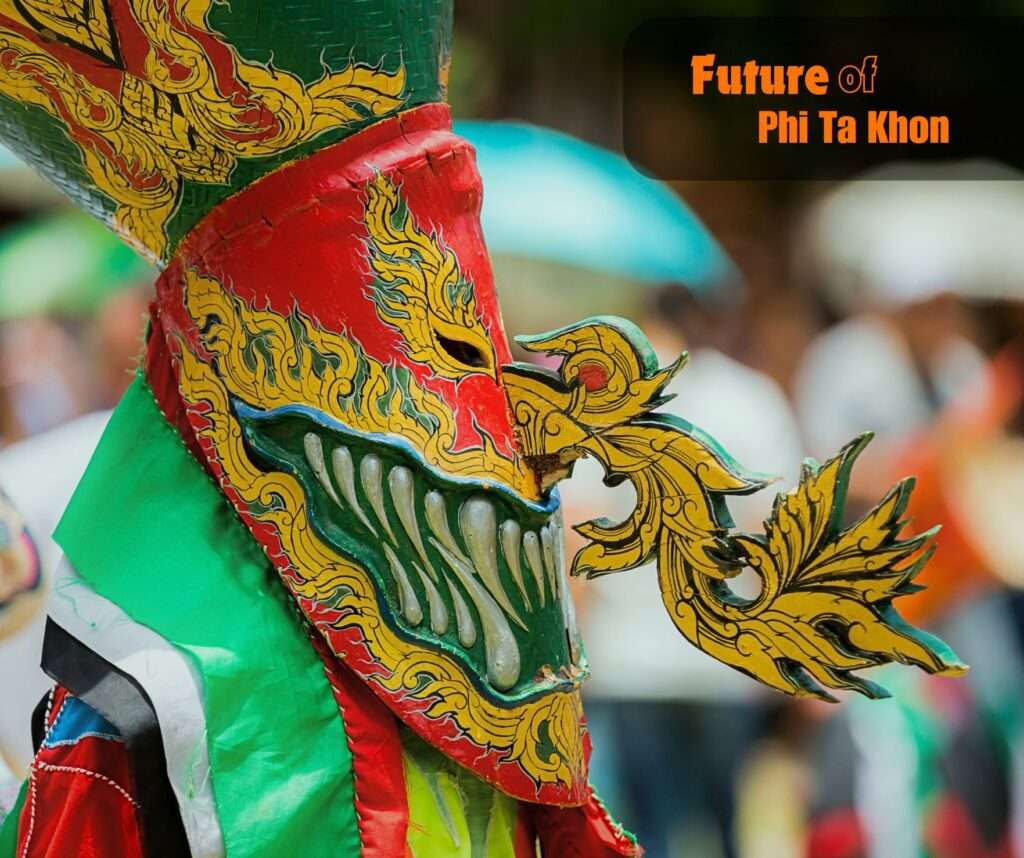
Challenges and Opportunities
As with any cultural tradition, Phi Ta Khon faces challenges, such as modernisation and the pressures of tourism. However, these challenges also present opportunities for the community to innovate, grow and find new ways to keep the festival alive and relevant.
Preservation Efforts for the History of Phi Ta Khon
Efforts are being made to preserve the festival’s traditions, including initiatives to teach mask-making and other customs to younger generations. These efforts ensure that the history of Phi Ta Khon will continue to be a cherished part of Thai culture for years to come.
Phi Ta Khon is usually celebrated over three days in June or July, aligning with the sixth or seventh lunar month. The dates are determined by the town’s spiritual leaders, who consult lunar calendars and local traditions to choose the most auspicious time.
Video: The History of Phi Ta Khon
Conclusion
Phi Ta Khon Ghost Festival is more than just a festival; it is a vibrant celebration of Thai culture, history, and community spirit. Through its unique blend of mythology, tradition, and modernity, Phi Ta Khon continues to captivate and enchant both locals and visitors alike. As we look to the future, the enduring appeal of this festival reminds us of the importance of preserving our cultural heritage and celebrating the rich tapestry of human traditions.

